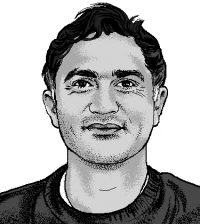A world of Ahabs and Naboths
For more commentary on this week's readings, see the Reflections on the Lectionary page, which includes Villegas's current Living by the Word column as well as past magazine and blog content. For full-text access to all articles, subscribe to the Century.
“The story of Naboth is old in time but daily in practice,” said Ambrose of Milan. “Who of the wealthy does not strive to drive off the poor person from his little acre and turn out the needy from the boundaries of his ancestral field?”
Our world was and is ruled by those who control militaries and cartels, banks and corporations—the heirs of King Ahab’s insatiable desire and unrestrained power. “Not, therefore, was one Ahab born,” proclaimed Ambrose, “but, what is worse, daily is Ahab born and never dies in this world. If one perishes, many others spring up.”
In Planet of Slums, Mike Davis describes a world full of Ahabs and Naboths, where people are displaced from their land as a result of globalized economic forces. Peasant farmers end up as “labor nomads,” immigrants who scavenge cities for some kind of income—working in the shadows of the skyscrapers, the fortresses of capital from which living wages seldom trickle down.
According to Rufino Domínguez of the Oaxaca region of Mexico, the North American Free Trade Agreement “drove the price of corn so low [in Mexico] that it’s not economically possible to plant a crop anymore. We come to the United States to work because there’s no alternative.”
People in power knew this would happen and planned for it by militarizing the U.S.-Mexican border. As Doris Meissner, the U.S. Immigration and Naturalization Service commissioner, said to members of Congress in 1993, “Responding to the likely short-to-medium-term impacts of NAFTA will require strengthening our enforcement efforts along the border.” Joseph Nevins includes this quote in his book Dying to Live—his phrase characterizing the many displaced peoples, labor nomads, who now die in the U.S. desert just north of the Mexican border.
The fear of death drives people from their land. Parents cannot bear the torture of their children’s cries of hunger. “Alarmed by this fear,” preached Ambrose in his sermon on Naboth’s vineyard,
the human race is now departing from its lands; the poor man, carrying his latest born, wanders forth with his little ones; his wife follows in tears, as if accompanying her husband to his tomb.
Isn’t this also a scene from our border?
When Ambrose retold the story of Ahab and Naboth, he put his listeners in the role of Ahab: the people who amass wealth and territory, regardless of collateral victims like Naboth. “The world has been made for all, and a few of you rich people are trying to keep it for yourselves,” he said. “For not merely the possession of the earth but the very sky, the air and the sea are claimed for the use of the rich few.”
With our wall and our border patrol, our country claims possession of the earth. Are our immigration policies and border control worth the life of the hundreds upon hundreds who die in the desert? Should we have to answer Elijah’s question to Ahab? “Thus says the Lord: Have you killed, and also taken possession?”






